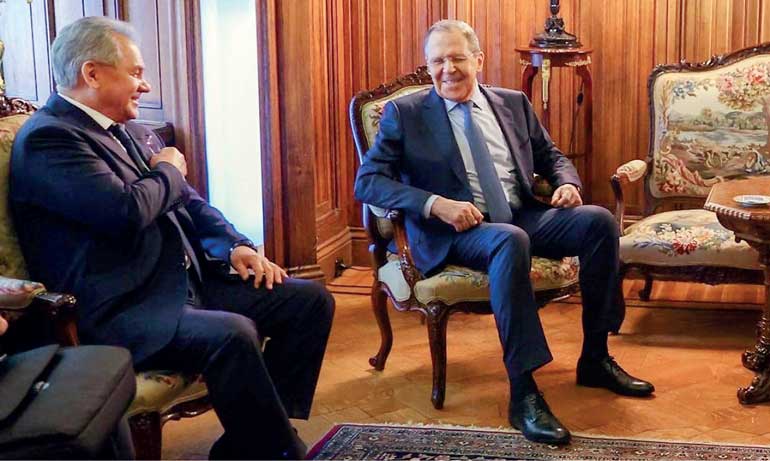Friday Feb 13, 2026
Friday Feb 13, 2026
Friday, 18 February 2022 00:00 - - {{hitsCtrl.values.hits}}

Russian Foreign Minister Sergei Lavrov (right) and Defence Minister Sergei Shoigu
For a few days recently, it looked like Europe was on the verge of war. The Western governments did their best to convince everyone that Ukraine was about to be invaded by Russia. At a White House press conference, the press thought that after the Iraq experience, they needed a bit more evidence to accept the claim that an invasion of Ukraine was imminent. Jake Sullivan replied that in Iraq, they were trying to start a war, but this time they were trying to prevent one. Somehow, he succeeded in looking like they were trying to provoke one.
their best to convince everyone that Ukraine was about to be invaded by Russia. At a White House press conference, the press thought that after the Iraq experience, they needed a bit more evidence to accept the claim that an invasion of Ukraine was imminent. Jake Sullivan replied that in Iraq, they were trying to start a war, but this time they were trying to prevent one. Somehow, he succeeded in looking like they were trying to provoke one.
The Russians had been engaged in intense diplomacy with the US and European governments in an effort to ensure their existential concerns regarding NATO expansion right up to their borders were addressed. The US requested that their written response to Russian documents containing their proposals not be disclosed. It turns out that the US had rejected Russia’s proposals. Russia was deploying troops along their border with Ukraine and conducting military exercises on land and sea in a show of strength. It was clear that a show of strength was what it was.
Panic was being spread in the West by their governments. Announcements were made of travel advisories and requests for US citizens to leave before Russian bombs fell on civilian lives. Those who stayed would be on their own, they said, for their government would be unable to save them. Ukraine itself was asking people to calm down. They didn’t want their people leaving. Russia was assuring that they weren’t about to invade since their interest was in NATO powers taking their long-discussed security concerns into consideration and diplomacy was still on.
And yet, the world was being told that Russia would invade Ukraine before the Winter Olympic Games were over. “We are very clear…” they said, that it is very likely that Ukraine would be invaded anytime.
It was “Deja Vu, all over again”.
What’s the buzz?
What would India feel if Sri Lanka were to formally express the desire and aim to enter into a military alliance with China? Should anyone consider how India feels? Aren’t we a sovereign country, and shouldn’t we be able to decide on our own security arrangements and with whom we ally militarily?
We have some indication of how that would go down with our closest neighbour. It’s not that long ago that a Chinese submarine was docked at one of our ports followed by a flurry of diplomatic activity to reassure India that such a thing will not happen again. Sri Lankan leaders take pains to assure India that no activity will be allowed on either land or sea which threatens India’s security concerns.
NATO is a military alliance. Ukraine used to be part of the Soviet Union. Now it’s an independent country. Russia would like to keep it that way. They refer to agreements which promised that NATO would not come too close to its borders. Ukraine insisted that it wants to exercise its sovereign right to join the EU and NATO. Suddenly everyone started throwing their toys out of their prams.
I don’t think the rest of the world panicked. They were thinking, where’s the adult in the room?
Long table de-escalation
Diplomacy was still on. European heads of state were visiting Moscow.
Anyone who knows anything about the Russian Federation knows that the Russians are serious people with serious weapons who are hardly likely to start a war without serious thought. They have a considerable number of well-developed strategic studies think-tanks with well-recognised scholars, academics and intellectuals—and some regularly brief the Kremlin. Their impressive international defence conferences are a reflection of the depth and breadth of their thinking on all strategic matters. Their recent convergence on a number of areas with China, even though it didn’t stretch to any kind of strategic alliance, also ensures that any surprise unilateral military adventure is most improbable.
It was a matter of time before Russia, having drawn their lines in dark red, would let their well-practiced diplomacy take over, and de-escalate. This happened on 14 February when Foreign Minister Sergei Lavrov, well known around the world for his skilled diplomacy (also known to us Sri Lankans for his ability to speak Sinhala), sat at one end of a very long table with President Putin at the other, and informed his boss that not all diplomatic options had been exhausted and there was still room for negotiations. Very considerable social distancing didn’t take away from the seriousness of the event which the Western media described as choreographed, which it probably was. It made good theatre.
Foreign Minister Lavrov informed the President that he was not satisfied with the responses he received from his counterparts. “…They basically said the right of a state to choose unions and join or replace them overrides everything else and is not a subject for discussion, as it were. We are reminding the Americans and our other Western colleagues that this right, formalised in OSCE top-level decisions at the 1999 and 2010 summits, the Russia-NATO 2002 Rome Declaration, and the Lisbon Declaration of the 2010 Russia-NATO summit, is not unconditional. This right is directly conditioned by other points that were supported, let me repeat, as a package by consensus. The second part of the package basically says that each state’s right to choose alliances is limited by its own commitments not to enhance its security at the expense of any other state.”
It’s easy to spot the hypocrisy if one imagines Cuba, entering into a military alliance with Russia or China. The collective Western howl would certainly be heard in Colombo. Colombo would in any case not agree with that position. Our stated position is that we don’t presume to use the sovereignty argument without considering India’s perceptions of the impact on its security.
However, in the second part of his conversation, Minister Lavrov informs President Putin that the responses were constructive: “The second part is more constructive to a certain extent. It envisages rather specific measures to address the problems of land-based short and intermediate-range missiles after the Americans discarded the corresponding treaty, the INF. It also contains specific proposals on a range of measures to reduce military risks, confidence-building measures and military transparency.”
Answering his president’s question whether there was “still … a chance of coming to terms with our partners,” Minister Lavrov said, “…as the head of the Foreign Ministry, I must say that there is always a chance.”
Minister of Defence Shoigu was next at the long table on 14 February. Defence Minister Shoigu is from the Buryat region of Russia which contains a Buddhist population. He heads a very well-trained army with impressive hardware coveted by many countries around the world, with our neighbour India being a valued customer.
He described the recent military exercises: “…the exercises involved drills against various types of hypothetical enemy attacks in all areas, including those of surface ships, submarines and of blue-water navies.”
Then comes a submarine story of their own, a bit different to ours. Minister Shoigu informs President Putin of a rogue submarine seen in their waters: “During the Pacific Fleet’s operations, as part of an exercise near the Kuril Island of Urup, we detected a submarine, presumably that of the United States. Following almost three-hour operations, the submarine was expelled from the territory of the Russian Federation. Actually, it had ventured over four kilometres into Russian territorial waters, a large distance, by local standards. We conducted special operations three times and forced the submarine to leave Russia’s territorial waters.”
Oh dear. That wasn’t nice. I mean it wasn’t very nice to sneak into somebody else’s territorial waters. A bit like an invasion, which everyone panics about.
Minister Shoigu was understandably offended. “Such activity in the East is absolutely incomprehensible and unjustified. But I want to repeat once again that the exercises will proceed: some of them are over, others are nearing completion...”
And thus, the de-escalation began and soon may it be completed.
World order
We have got an unexpected glimpse into ‘world order games’. When the dust settles, the players will have learnt the limits of their strengths and the imperative of compromise. The shape of this new understanding will spill over into all international relations, including into our region, whichever way one decides to describe it, the Indo-Pacific or Asia-Pacific.
Some players came off looking better than others. The British will want to forget the meeting of the Foreign Ministers in Moscow and their Foreign Secretary’s faux pas with it. Not to be outdone, the British press provided the ammunition for the Russians to take the mickey, reporting that the “invasion” would take place at “3 a.m. local time on Wednesday (0100 GMT)”! They cited “anonymous US intelligence officials as sources for the claim”. This being too tempting a target to overlook, the irascible Dimitri Peskov, President Putin’s Press Secretary suggested that the Ukrainians set their alarms so as not to miss it!
But the critical importance of well-considered diplomacy intelligently conducted by competent persons was made clear to the world, and all efforts at ensuring the possession of such skills and persons able to conduct it without embarrassing themselves and their countries, may be the only way to avoid wars.